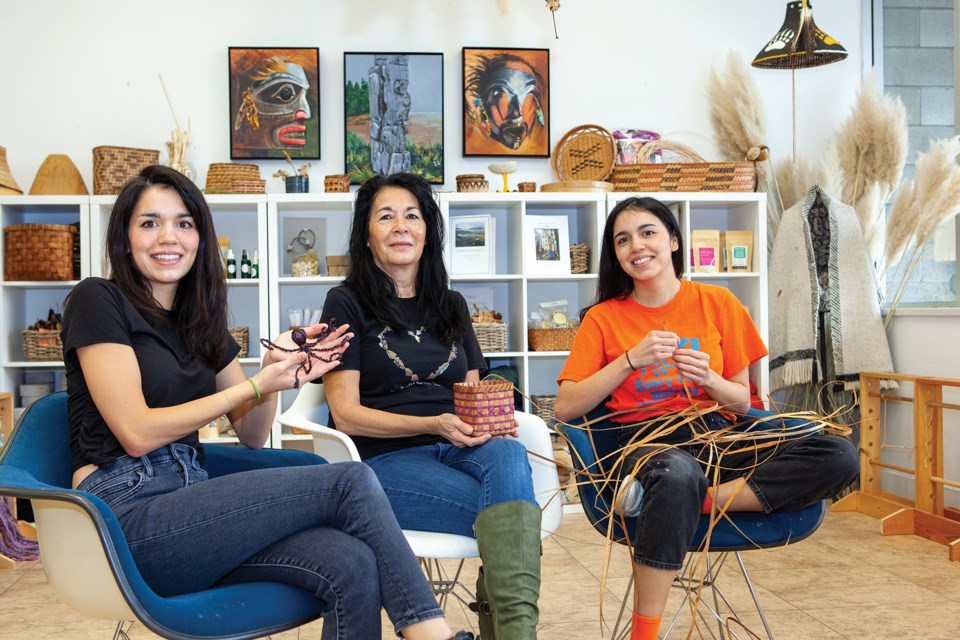The final gathering of a two-year series dedicated to sharing Coast Salish weaving practices while fostering truth and healing took place this week in Sechelt.
Earlier workshops of the Weaving a Gathering Place series involved cohorts of Indigenous women and Indigenous girls under the tutelage of master weaver Jessica Silvey, who is of shíshálh, Skwxwú7mesh, Tla’amin, and Portuguese ancestry. Silvey also led the eight-member group of non-Indigenous women who assembled on Wednesday, concluding a series of twice-weekly collaborations that began in September.
“We’ve laughed, we’ve cried, we’ve eaten some good food,” said Silvey. “We’ve woven things, we’ve painted things, we’ve made things that we’ve eaten, cried some more and laughed some more. It’s been this amazing place of connection for women and children, a safe space that promotes healthy opportunities and love.”
For more than half a decade, Silvey has owned and operated Red Cedar Woman Weaving Studio in Sechelt. In the early days of the COVID-19 pandemic, she began conversations with the Sunshine Coast Arts Council about the potential for connecting women through the sharing of medicine and plant teachings, cedar preparation and basket making.
“We were really trying to find a balance between [offering] a program and creating a kind of community gathering space,” said Sadira Rodrigues, curator and director of the Sunshine Coast Arts Council. “That was in May 2021. Here we are in Spring 2023, and it’s so much richer than we could have ever imagined. I’ve witnessed women and girls building not just skills, but confidence, and the building of their networks.”
Resources for the initiative came from local organizations including the Sechelt Downtown Business Association and the Sunshine Coast Foundation. The foundation provided funding through a program designed to promote gender equality, allowing women and girls to participate at no charge.
Eliminating barriers like cost was important to Silvey. She also recognized the need for a nurturing environment to assuage the emotional trauma from burial site discoveries at former residential schools.
Workshop participants learned macrame, the use of natural dyes, and the art of interlacing the cedar strips that Silvey gathers with family members each year.
“It’s amazing how cedar bark and glue and a little bit of water connects children and women,” Silvey said. The setting allows participants to have tough conversations while expressing creativity. The latest cohort, composed of self-described settler women, fashioned birds’ nests from cedar as symbols of rebirth and maternal devotion.
For Rodrigues, the art of weaving gives physical shape to the process of reconciliation between Indigenous and non-Indigenous cultures. “It’s pretty extraordinary evidence of how culture is an incredibly important platform and tool in this process,” she said. The 2015 report of Canada’s Truth and Reconciliation Commission included 94 calls to action, specifically prioritizing collaborative cross-cultural art projects.
Weaving a Gathering Place was directed by a leadership circle formed of shíshálh Elders recruited by Silvey. The oldest participating weaver, who will turn 80 this year, regularly drops in to offer advice and encouragement during sessions.
Red Cedar Woman and the Arts Council are exploring ways to extend and expand the program beyond its two-year pilot.
“Our weavers are really aware that truth needs to come out in a much larger manner than it already has,” said Silvey. “There is no reconciliation if there’s no truth. So we need to keep learning and we need to keep questioning.”


.png;w=120;h=80;mode=crop)
